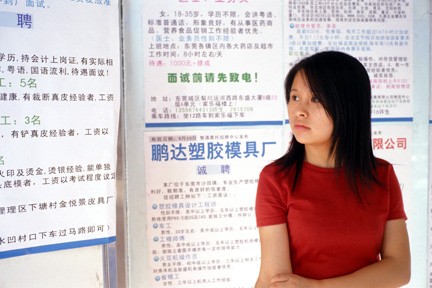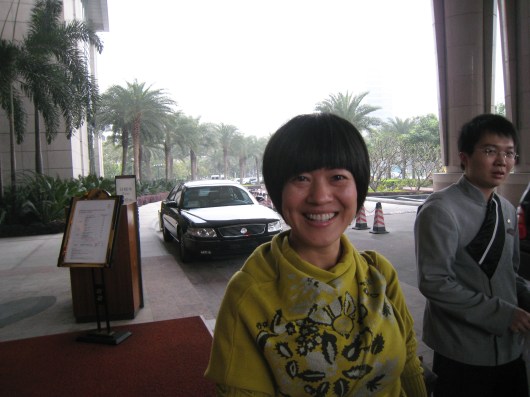[ted id=1554 width=560 height=315]
It’s hard not to get a lump in your throat when you read about the grueling conditions in Chinese factories. It’s hard not to feel guilt about those working 70 hours a week in Foxconn factories where iPhones and iPads are assembled, or to feel shocked at revelations that workers in toy factories regularly receive fines for going to the bathroom without permission.
But as Leslie T. Chang, the author of the book Factory Girls: From Village to City in a Changing China, explains in this talk from TEDGlobal 2012, those emotions obscure a larger point — that factory workers aren’t simply toiling to provide cheap products to the West. They are also toiling to make products for their own people, as well as to change their personal circumstances.
“We, the beneficiaries of globalization seem to exploit these victims with every purchase we make and the injustice feels embedded in the products themselves,” Chang says. “This simple narrative equating Western demand and Chinese suffering is appealing … but it’s also inaccurate and disrespectful. We must be peculiarly self-obsessed to imagine that we have the power to drive tens of millions of people on the other side of the world to migrate and suffer in such terrible ways … By focusing so much on ourselves and our gadgets, we have rendered the individuals on the other ends into invisibility, as tiny and interchangeable as the parts of a mobile phone.”
In China, more than 150 million workers — 1/3 of them women — have left villages to work in factories, hotels and construction sites. So who are these women? Chang spent two years in Dongguan, an industrial city in China’s Pearl River Delta, interviewing assembly line workers to learn what their lives are like and how they process their experiences.
To hear more about what Chang found, listen to her moving talk. Below, see photos and bios of the two young women Chang got to know best during her research.
Name: Lu Qingmin
Age: 26
Hometown: Yangshan Village, Hubei Province
Current job: Purchaser in a factory making construction cranes
Past jobs: Assembly-line worker in electronics factory; clerk in mobile-phone factory; human-resources clerk in rubber factory; human-resources clerk in handbag factory; purchasing assistant in hardware factory
Ambition: “A person should have some ambition while she is young, so that in old age she can look back on her life and feel that it was not lived to no purpose.”
Quote: “Desire is eternally unsatisfied. Don’t you think so?”
Name: Wu Chunming
Age: 37
Hometown: Jiugongqiao Township, Hunan Province
Current job: Signing up franchisees for a chain of traditional-style teahouses; private-equity investments.
Past jobs: Assembly-line worker in toy factory; selling health products; sales training for company selling funeral plots; selling Tibetan medicine; newspaper reporter; selling building materials; running building-materials wholesale company; running plastic-injection molding machine company; selling life insurance; selling feminine-hygiene and children’s products; selling imported wine, cosmetics, and air fresheners; selling synthetic leather for shoes
Ambition: “I want to keep raising the quality of my life. I want to find new kinds of happiness.”
Quote: “We were born into the world poor through no fault of our own. But to die poor is a sin.”
As Chang sums it up, “It is globalization — this chain that begins in the Chinese farming village and ends with iPhones in our pockets and Nikes on our feet — that has changed the way these millions of people work, marry, live and think. … When you talk to workers, they don’t say, ‘I want better hot water in the showers, I want a nicer room, I want a TV set.’ It would be nice to have those things, but that’s not why they’re in the city. From their perspective, where they’re coming from is much worse and where they’re going is much better.”


Comments (41)
Pingback: A Woman’s Doing (Title) – Learner Alliance
Pingback: Who to blame? And how to fix? – Business Ethics Case Studies
Pingback: What You Need to Know About China's Surprising Strengths in Innovation • Reliable Tech & IT Blog for Everyone
Pingback: What You Need to Know About China’s Surprising Strengths in Innovation | Global Times
Pingback: What You Need to Know About China's Surprising Strengths in Innovation - AltoSky - AltoSky
Pingback: What You Need to Know About China’s Surprising Strengths in Innovation | AGReGate.info
Pingback: What You Need to Know About China’s Surprising Strengths in Innovation | The H2O Standard
Pingback: What You Need to Know About China’s Surprising Strengths in Innovation | charleswright044
Pingback: What You Need to Know About China's Surprising Strengths in Innovation | Cesar Vela
Pingback: What You Need to Know About China's Surprising Strengths in Innovation - #1 Info Portal
Pingback: What You Need to Know About China's Surprising Strengths in Innovation - LiberalVoiceLiberalVoice — Your source for everything about liberals and progressives! — News and tweets about everything liberals and progressives